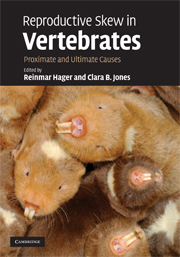Book contents
- Frontmatter
- Contents
- List of contributors
- Foreword
- Preface
- Part I Reproductive skew theory
- Part II Testing assumptions and predictions of skew models
- Part III Resolving reproductive conflicts: behavioral and physiological mechanisms
- 12 Reproductive skew in female common marmosets: contributions of infanticide and subordinate self-restraint
- 13 Reproductive skew in African mole-rats: behavioral and physiological mechanisms to maintain high skew
- 14 The causes of physiological suppression in vertebrate societies: a synthesis
- Part IV Future directions
- Taxonomic index
- Subject index
14 - The causes of physiological suppression in vertebrate societies: a synthesis
from Part III - Resolving reproductive conflicts: behavioral and physiological mechanisms
Published online by Cambridge University Press: 02 February 2010
- Frontmatter
- Contents
- List of contributors
- Foreword
- Preface
- Part I Reproductive skew theory
- Part II Testing assumptions and predictions of skew models
- Part III Resolving reproductive conflicts: behavioral and physiological mechanisms
- 12 Reproductive skew in female common marmosets: contributions of infanticide and subordinate self-restraint
- 13 Reproductive skew in African mole-rats: behavioral and physiological mechanisms to maintain high skew
- 14 The causes of physiological suppression in vertebrate societies: a synthesis
- Part IV Future directions
- Taxonomic index
- Subject index
Summary
Summary
In many vertebrate scieties, skews in reproductive success are underpinned by the down-regulation of one or more components of the reproductive physiology of subordinates relative to those of their same-sex dominants, a condition termed physiological suppression. The considerable body of research into the causes of physiological suppression is therefore of key relevance to attempts to understand the causes of reproductive skew. In this chapter, I draw this work together by outlining a single adaptive framework for understanding the causes of physiological suppression across vertebrate societies in general.
I suggest that two largely distinct adaptive explanations exist for physiological suppression in a given subordinate at any given time: “subordinate restraint” and “active interference” by the dominant(s). Both processes may act in tandem to maintain physiological suppression across subordinates in any given species, with dominants employing active interference to counter, or guard against, any lapses in subordinate restraint.
Subordinates may be expected to exercise physiological restraint whenever their expected fitness payoff from maintaining their fertility drops below zero. Any factors that diminish a subordinate's expected fitness payoff from maintaining its fertility could therefore favor the evolution of restraint, including those that may act regardless of the presence of the dominant and those that arise directly from the presence and/or likely actions of the dominant.
Dominants may attempt to actively and forcibly disrupt the reproductive physiology of subordinates whenever (1) they stand to benefit from disrupting subordinate reproduction, and (2) fertility disruption per se is a favored means of achieving this (as opposed to other disruptive tactics such as infanticide). Dominants may actively disrupt subordinate fertility by subjecting them to chronic physiological stress.
- Type
- Chapter
- Information
- Reproductive Skew in VertebratesProximate and Ultimate Causes, pp. 397 - 436Publisher: Cambridge University PressPrint publication year: 2009
- 26
- Cited by



